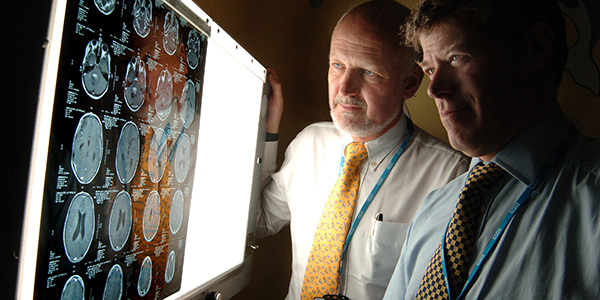
November 3, 2015, by Emma Thorne
Nottingham professors back e-petition for brain tumour research funding
Experts at The University of Nottingham are backing an online petition calling for an increase in funding for research into brain tumours, with the hope of seeing the issue discussed by MPs.
Professors David Walker and Richard Grundy, Co-Directors of the University’s Children’s Brain Tumour Research Centre (CBTRC) are urging members of the public to sign the e-petition which has been launched via the UK Government and Parliament’s Petition website by Maria Lester, whose brother died at the age of 26 after battling a brain tumour for seven years. The petition supports a campaign by the charity Brain Tumour Research to increase funding for research into this deadly disease, cases of which it says are on the increase. Less than 20% of people diagnosed with a brain tumour survive beyond five years and it is the most deadly cancer affecting the under-40s. Despite this, brain tumours receive just 1.5% (£7.7 million) of the £498 million national spend on research into cancer. The charity is calling on the Government and larger cancer charities to raise investment to £30-£35 million a year. The petition has until February 3 2016 to secure 100,000 signatures. If it can reach this target the issue will be considered for debate in Parliament.
As a result, the Petitions Committee has launched an inquiry into funding for brain tumour research. During the first part of the inquiry, the Committee hosted a web forum on which people were invited to share their thoughts on the issue and personal experiences of brain tumours. The committee is now holding several ‘oral evidence’ sessions – the first of which took place today (Tuesday November 3) – to continue gathering information on the issue.
Professors Walker and Grundy have written to the chair of the committee, the Right Honourable Helen Jones MP, to voice their support for the petition and to voice their concerns over current levels of funding for research into brain tumours. While they acknowledge that there had been a modest rise in public charity funding, they argue that the level of funding does not reflect the societal impact of brain tumours.
They add: “The UK has many excellent research facilities, however their interest has not been focussed upon this area of work due to a lack of awareness. Our experience of 16 years research in this field highlights the diverse range of research methods that are needed to meet the needs of the patients and their families and dependants, suffering from the serious disabling and life threatening nature of these tumours, across the human lifespan.
“At the time CBTRC was launched in 1997, it was acknowledged that there was no credible strategy supporting research in this field in the UK. Our initiative included political lobbying to raise awareness. As part of that, we developed research to support revised diagnostic guidelines for children with symptoms suggestive of brain tumour, with a view to reducing delays in diagnosis and the associated risks. This guideline was published by the Royal College of Paediatrics and Child Health (RCPCH) in 2008 and the subsequent launch of the HeadSmart Be Brain Tumour Aware campaign. We are currently reporting a greater than 50% reduction in total diagnostic interval across the UK, compared to pre-campaign levels, bringing the UK to the top of the published rankings in this type of research (Neuro-Oncology in Press). This national campaign to accelerate diagnosis is a “world first in childhood cancer” and is based upon a public and professional awareness strategy.
“The Children’s Brain Tumour Research Centre at The University of Nottingham recently benefited from targeted fundraising led by our Vice-Chancellor Sir David Greenaway when he chose to lead a team of 15 cyclists over 1400 miles to the four corners of Great Britain in the summer of 2014 as part of Life Cycle 4. He was motivated to do this after meeting the children and their families affected by brain tumours and witnessing the impact of research upon their sense of hope and concern precipitated by the situation in which they find themselves. Throughout that arduous bicycle journey many people who had been touched by the effect of brain tumour on themselves or their friends and relatives contacted the riders on the road and told their stories. We rode in honour of 15 remarkable children and their families, whose stories of courage provided immense motivation. The public responded to our request for support by donating over £820,000 within just a few months of fundraising.
“On this basis we at the University of Nottingham are proud to have launched the Children’s Brain Tumour Research Centre in 1997 and see it grow. Our experience of public support since 1997 and in particular during 2014 brings the voices of over 5,000 people who have made substantial personal donations to our campaign. We urge the Commons Select Committee to promote this petition for enhanced research provision for consideration by HM Government. The current 9th place ranking in funding allocation within NCRI is an undervaluation of the clinical and scientific priority of this topic for research. We will commit ourselves to assisting with recruiting signatures on this petition to encourage a formal debate in Parliament as we have direct experience of the power of awareness as a major tool to drive improvements, HM Government’s help in this would be of immense value.”
The e-petition can be signed online on the UK Government and Parliament Petitions site.

Thank you so much for helping to share this petition. My little brother had his bright future snatched from him by this cruel disease and I will fight hard to make sure that centres like yours get the vital funding you deserve. MPs are looking into this issue right now so please encourage everyone you can to sign and share. Together our voices will be heard in the fight against the biggest cancer killer of children.